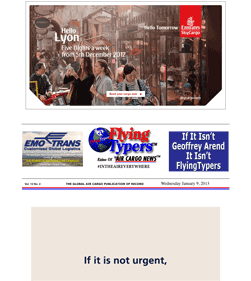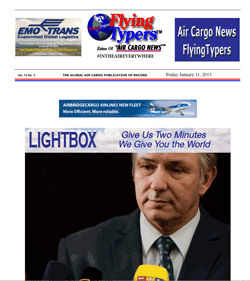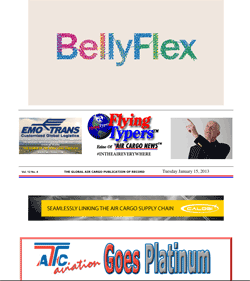|
|
||||||||
 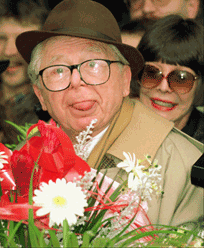 Actress
Sally Field
immortalized
the acceptance
speech in
1985 when
she was
awarded
Best Actress
in the film
Places In
The Heart. Actress
Sally Field
immortalized
the acceptance
speech in
1985 when
she was
awarded
Best Actress
in the film
Places In
The Heart.Ms. Field (who is again nominated for an Oscar in 2013 for her role in the movie Lincoln) gushed, "You like me! Right now you like me!” Those sentences became a punch line around the world. Billy Wilder, the great German-born movie director whose 100th birthday was celebrated in 2007, (he died in 2002 at 95), uttered the best quote ever about awards. Among the masterpieces Wilder directed are "Some Like It Hot", "Sunset Boulevard", and the equally great and somewhat overlooked "One, Two, Three". Wilder said: “Awards are like hemorrhoids: once in a lifetime every asshole gets them.” |

However,
there is one
award that has
long legs in
air cargo history,
and that is
the TIACA Hall
of Fame.
Whether
you agree with
who has won
that recognition
(and there seems
to be a requisite
number of recent
winners who
are also supporters
of the organization),
the TIACA HOF
is a one of
a kind sanctuary
for some air
cargo builders
who have done
some truly great
things and otherwise
might have been
forgotten to
history, like
the wonderful
Walter H. Johnson,
Siegfried “Siggi’
Koehler, Robert
Arendal, Ram
Menen, Bill
Spohrer, Joseph
Berg, John Emery,
Jr. and others.
The
most appealing
aspect of the
TIACA Hall of
Fame is that
the inductees
are chosen from
the people attending
almost every
air cargo industry
gathering, including
TIACA events.

Of
course a gaping
overlook in
the TIACA HOF
scheme (and
everywhere else)
is that, to
date (in TIACA’s
case), not a
single woman
has made it
to the HOF.
But
that said, hope
for equality,
or at least
balance, springs
eternal, as
does a long
list of excellent
choices at the
point TIACA
gives women
the vote.

We
close our annual
awards tirade
raising one
more point:
Why
not bring back
some vestige
of the triumphant
and beautiful
grand trophies
that were awarded
during the first
generation of
aviation? It
might make some
of these awards
worth winning.
| Great Trophies of Aviation |
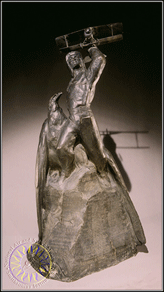 |
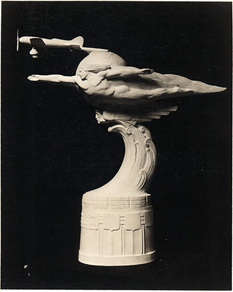 |
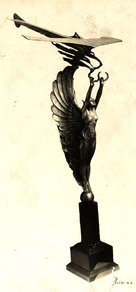 |
|
Pictured
left to
right—The
Harmon Trophy
came into
being in
1926 when
Clifford
B. Harmon,
a wealthy
sportsman
and aviator,
established
three international
trophies
to be awarded
annually
to the world's
outstanding
aviator,
aviatrix,
and aeronaut.
The Harmon Trophy—the aviator's award—is given for the most outstanding international achievements in the preceding year, with the art of flying receiving first consideration. The Bendix Trophy for cross-country races, sponsored by the Bendix Corporation, begun in 1931. The award was established to encourage aviation progress. Winner of the first race was Major James H. Doolittle who flew from Los Angeles to Cleveland, Ohio at an average speed of 223 miles per hour. The PulitzerTrophy, established in 1920 by American publishing magnate, Ralph Pulitzer, who created a speed contest to encourage U.S. designers to build faster airplanes. |
||
The
Bendix, Harmon,
and Pulitzer
Trophies are
magnificent
works of art
and testimonies
to the beauty
of the Art Deco
period. Gorgeous
honorariums,
they were given
to the likes
of Doolittle,
Lindbergh, and
later to others
who advanced
aviation.
Air
cargo should
create a grand
award that is
beautiful, believable,
and passed on
from year to
year to the
next generation
in the industry.
There
is no doubt
the air cargo
awards trend
will continue.
P.T. Barnum,
the great American
showman who
made the Circus
and sideshow
freaks famous
100 years ago,
once said: “There’s
a sucker born
every minute.”
Surveying
the manner in
which the industry
creates winners
and losers out
of hardworking
air cargo companies
and people,
and in some
cases even expects
folks to pay
for that honor,
strikes us as
just too dumb
to be believed.
Maybe
there should
be an award
for the award
givers: “Best
Presenter of
Dubious Distinctions.”
Your move.
Geoffrey
Arend
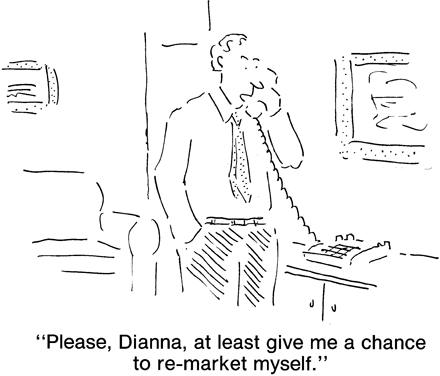 |
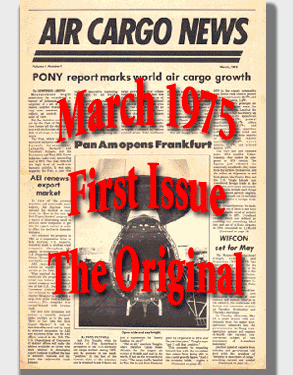 |
Get
On Board Air
Cargo News FlyingTypers |
If
You Missed Any
Of The Previous
3 Issues Of FlyingTypers
|
|||||
|
|||||
FT010913 |
FT011513 |
||||
|---|---|---|---|---|---|


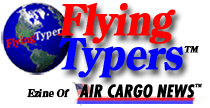


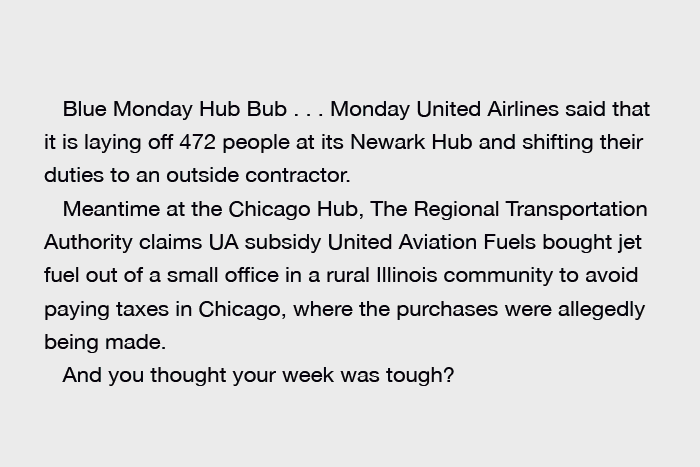
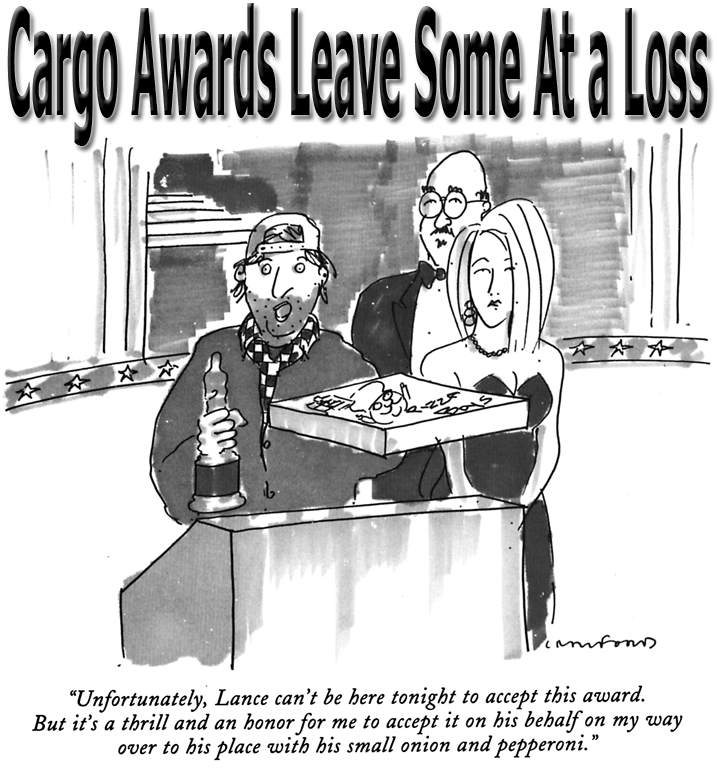

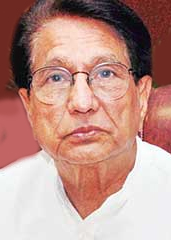
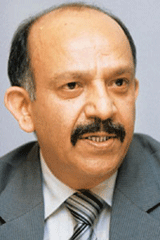 Anil
Khanna, (left)
Managing Director
of Blue Dart Express,
echoed Kumar’s
views. He was
of the opinion
that the airlines
had increased
the fuel surcharge
by 70 percent
in 2011 when the
price of crude
oil was low. At
that time, the
airlines increased
the FSC and since
the charges were
not explained,
it was difficult
for the express
companies to convince
the consumers.
Anil
Khanna, (left)
Managing Director
of Blue Dart Express,
echoed Kumar’s
views. He was
of the opinion
that the airlines
had increased
the fuel surcharge
by 70 percent
in 2011 when the
price of crude
oil was low. At
that time, the
airlines increased
the FSC and since
the charges were
not explained,
it was difficult
for the express
companies to convince
the consumers.
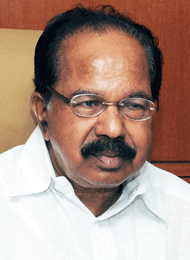 omestic
airlines, but
mentioned international
carriers as well.
These carriers
were overcharging
cargo freight
in the garb of
fuel surcharge,
which adversely
affected Indian
consumers and
hampered the economic
development of
the country. Therefore,
said CUTS Secretary
General Pradeep
S, Mehta, “such
activities needed
to be investigated
by the Competition
Commission of
India (CCI).”
omestic
airlines, but
mentioned international
carriers as well.
These carriers
were overcharging
cargo freight
in the garb of
fuel surcharge,
which adversely
affected Indian
consumers and
hampered the economic
development of
the country. Therefore,
said CUTS Secretary
General Pradeep
S, Mehta, “such
activities needed
to be investigated
by the Competition
Commission of
India (CCI).”